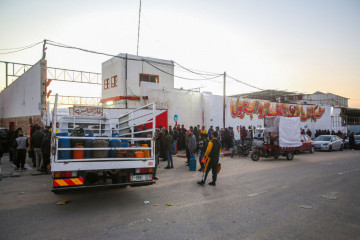

In the absence of strategic gas reserves and frequent electricity outages, Gazans are forced to rely on cooking gas cylinders to stay warm, feed their families and run their businesses.
Whilst this is a regular occurrence, the plummeting temperatures that have hit the Gaza Strip this winter has meant that many families have had to buy more and more gas cylinders to survive, leading to shortages throughout the besieged enclave.
"According to the Hamas-run Ministry of Economy, the Gaza Strip requires 250-300 tonnes of gas cylinders each day...Yet, the quantities imported to the Gaza Strip at the present time doesn't exceed 170 tonnes per day"
Speaking to The New Arab, Neama al-Khalili complains each winter is a fight for survival since she is forced to resort to buying gas cylinders to warm her home and her family when the electricity inevitably goes out.
"Throughout the year, I normally consume a 12-kg cylinder of gas each month, but in winter I have to double my usage," the 35-year-old mother of four told The New Arab, adding that "it further burdens our familial expenses, given that each cylinder costs us $23."
Rami, Neama's husband, works as a day labourer in one of Gaza's biscuit factories, receiving just $12 a day. "A gas cylinder now costs my husband two days of his salary," Neama said. And this isn't the only knock-on effect of the gas crisis that continues to plague Gaza.
"My husband also has less work now, since the factory that he works in is also affected by the gas crisis." Nowadays, Rami is only able to work either two or three days a week, which means that the al-Khalil family now struggles to buy their basic necessities.
However, their suffering does not stop there. Each day, thousands of Gazans queue for hours to buy the gas needed. "Each year is the same. We [the Gazan people] still don't know why the crisis hasn't been resolved, we don't know who is responsible for these crises... is it the Israeli occupation or the Palestinian politicians?" Neama told The New Arab.
Regrettably, this experience is one that is all too common for the residents of Gaza. Rady Ibrahim often has to wait till the early hours of the morning before he can fill up his gas cylinder, a process that he has to repeat throughout the winter season. A taxi driver by trade, he uses gas to run his car, which is significantly cheaper than fuel.
The father of seven told The New Arab "I work as a taxi driver 12 hours a day to support my family, but now I have to spend a significant portion of my day waiting in front of the gates of gas filling stations." When there is a lack of gas, Ibrahim isn't able to work for several days, thus threatening his family with starvation.
"The crisis could be avoided by greater coordination between the government-run by the Palestinian Authority and the Association of Oil and Gas Owners in Gaza"
Fares al-Massoudi, one of Gaza's gas distributors, confirmed that the onset of the yearly gas crisis began one month ago, however in January, it has worsened significantly. Fares attributes this crisis to the limited amount of gas that is able to enter the Gaza Strip from Israel, which controls the only commercial crossing, Kerem Shalom, from Israel into the Gaza Strip, as well as the fact that drivers like Rady have to operate their cases on gas instead of fuel due to the latter's exorbitant price.
Fares also pointed out that the gas crisis has affected his work. The gas crisis has reduced the number of cylinders that he is able to fill in the filling stations, with the average number decreasing by approximately 450 cylinders per month. Before the crisis, he was able to fill up to 900 cylinders per month.
"Now the cylinders remain with the distributors for a prolonged period of time, sometimes exceeding two weeks. Beforehand it used to be processed within a few days," Fares told to The New Arab.
According to the Hamas-run Ministry of Economy, the Gaza Strip requires 250-300 tonnes of gas cylinders each day to maintain homes, bakeries, poultry farms, hospitals, and other infrastructure. Yet, the quantities imported to the Gaza Strip at the present time doesn't exceed 170 tonnes per day.
Aeid Abu Ramadan, Secretary of the Association of Oil and Gas Owners in Gaza, said that the crisis could be avoided by greater coordination between the government-run by the Palestinian Authority and the Association of Oil and Gas Owners in Gaza, which may lessen the effects of the gas crisis on regular citizens.
Such coordination may take the shape of a strategic stockpile, or if the government in Gaza decides to build warehouses or create credit facilities for importers to buy gas to store.
"Despite the siege and the possibility of the Gaza Strip being attacked by Israel, it still remains possible to create strategic storage facilities that prevent panic buying, and implement measures that control the incidence of motor owners from using gas to run their vehicles," Aeid added.
Sally Ibrahim is The New Arab's correspondent from Gaza





 Follow the Middle East's top stories in English at The New Arab on Google News
Follow the Middle East's top stories in English at The New Arab on Google News


